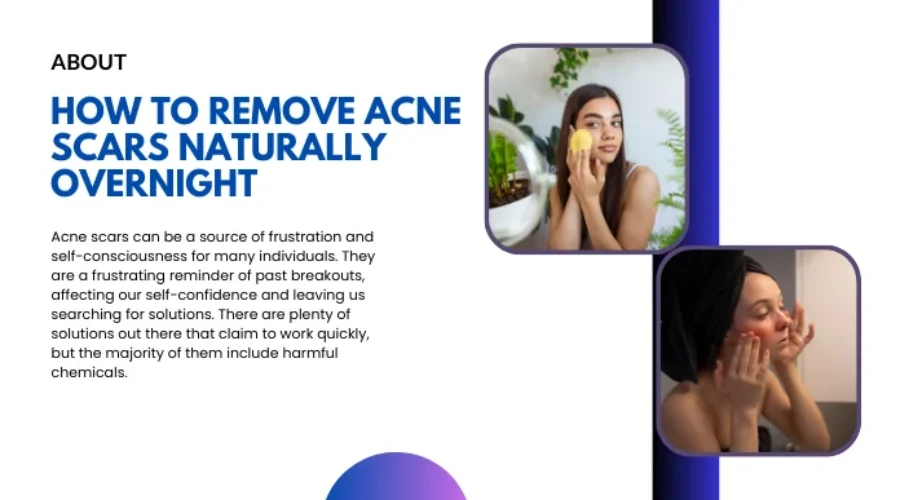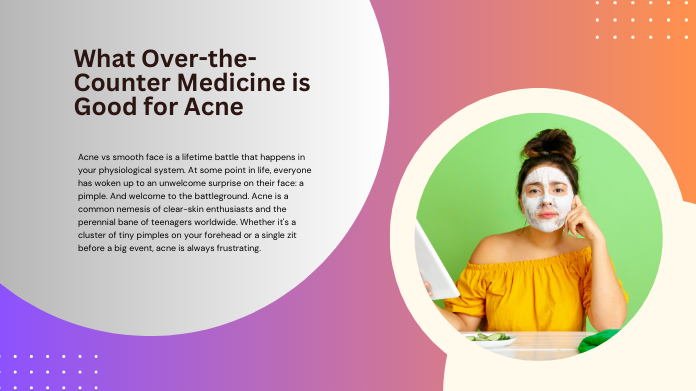How to Remove Acne Scars Naturally Overnight
Acne scars can be a source of frustration and self-consciousness for many individuals. They are a frustrating reminder of past breakouts, affecting our self-confidence and leaving us searching for solutions. There are plenty of solutions out there that claim to work quickly, but the majority of them include harmful chemicals. Natural remedies can potentially assist in reducing the appearance of acne scars over time. It’s essential to remember that overnight results are impossible, but with consistent use, these remedies may contribute to gradual improvement.
In this article, we will provide practical tips on treating acne scars using simple ingredients found in your kitchen or bathroom cabinet.
Understanding Acne Scars
Acne scars form due to the skin’s attempt to heal itself after experiencing inflammation caused by acne breakouts. The follicles in the skin clog with excess oil, dead skin cells, and bacteria and lead to the formation of pimples, cysts, or nodules. Then, when pimples or cysts penetrate deep into the skin, they harm surrounding tissues and slow down collagen formation.
Collagen is a crucial protein that aids skin’s structural integrity and endurance. During the healing process, the body attempts to repair the damaged tissue by producing new collagen fibers. However, this process doesn’t always go smoothly, leading to the formation of acne scars.
However, acne scarring can differ in severity and appearance among individuals. Several factors can contribute to the development of noticeable scarring from acne. These factors include genetics, skin type, and the depth of the acne lesions.
Different Types of Acne Scars

Acne scars come in different types, each with its own characteristics and treatment approaches. Understanding these can help determine the most appropriate treatment options.
1. Atrophic Scars
A loss of tissue or depressions in the skin characterizes atrophic scars. There are three subtypes of atrophic scars:
Ice Pick Scars: These scars are narrow and have a deep, v-shaped appearance. They usually extend into the deeper layers of the skin.
Boxcar Scars: Boxcar scars are wider depressions with sharp edges. They resemble small craters on the skin surface.
Rolling Scars: Rolling scars create an undulating or wavy texture on the skin. They appear as shallow depressions that give the skin a rolling or uneven appearance.
2. Hypertrophic Scars
An excessive amount of collagen formation during the healing phase leads to hypertrophic scarring. The excess collagen causes raised or thickened scars, usually within the boundaries of the original wound.
3. Keloid Scars
Keloid scars also result from excessive collagen production but extend beyond the boundaries of the initial wound. These scars are often raised, thick, and may exhibit a firm texture.
Medical Treatments Based on Acne Scar Types
Atrophic Scar Treatments
Dermal Fillers: Injecting fillers into atrophic scars can help raise them to match surrounding skin levels, minimizing their visibility.
Microneedling: For this method, extremely tiny needles are used to stimulate collagen production and improve scar texture.
Chemical Peels: Chemical peels are a non-invasive method of exfoliation, encouraging new cell growth and reducing the appearance of superficial scarring.
Laser Resurfacing: Laser therapy can target specific areas of scarring, promoting collagen production and improving the overall texture of the skin.
Hypertrophic and Keloid Scar Treatments
Silicone Gel or Sheets: Applying silicone gel or sheets to hypertrophic or keloid scars can help flatten and soften them over time.
Corticosteroid Injections: Steroid injections directly into the scar tissue can reduce inflammation and flatten raised scars.
Pressure Dressings: Applying pressure dressings to hypertrophic or keloid scars can help minimize their size and thickness.
Home Remedies for Acne Scars
Several practical and detailed home remedies for acne scars might improve your skin. Let’s explore some popular home remedies and how to use them effectively:
Lemon Juice
It is known that lemon juice can naturally bleach, which can help acne scars fade over time. First, use a mild cleaner to wash your face and pat it dry. Put some fresh lemon juice in a small bowl, and then dip a cotton ball in it. Apply the lemon juice directly onto the acne scars, avoiding any open wounds or active acne lesions. Leave it on for about 10-15 minutes, then rinse off with warm water. Repeat this process 2-3 times a week.
Aloe Vera Gel
Healing and soothing qualities of aloe vera gel can help skin heal and make acne scars look less noticeable. Slice open a leaf of aloe vera to extract its gel. Apply the gel directly onto clean skin and gently massage it using circular motions. Leave it on for 30 minutes or overnight if preferred, then rinse off with lukewarm water. You can repeat this process daily until you see improvement in your acne scars.
Honey and Cinnamon Pack
Combining honey and cinnamon can help exfoliate the skin, reduce inflammation, and fade acne scars. Mix a half teaspoon of cinnamon powder with one tablespoon of honey to create a paste-like consistency. Cleanse your face thoroughly before applying the pack to the affected areas. Leave it on for 10-15 minutes, then rinse off with warm water. Use this remedy once or twice a week.
Potato Slices and Juice
Potatoes contain enzymes that help lighten pigmentation and reduce the appearance of scars, including acne scars. Cut thin slices from a raw potato or blend it to extract its juice using a blender or juicer machine. If using potato slices, rub them gently onto clean skin for a few minutes, focusing on the acne scars. Leave the juice or slices on for around 20 minutes, then rinse off with water. Repeat this process daily or several times a week for best results.
Tea Tree Oil, Coconut Oil, and Turmeric
Antimicrobial characteristics in tea tree oil can help fight bacteria that cause acne. Coconut oil moisturizes the skin, and turmeric is an anti-inflammatory agent. Mix two drops of tea tree oil with two tablespoons of coconut oil and a pinch of turmeric powder until well blended. Apply the mixture to clean the skin and leave it on for 30 minutes before rinsing off with warm water. Use this remedy once a day.
Baking Soda
Baking soda is often used as a gentle exfoliant to remove dead skin cells and fade acne scars over time. Make a thick paste by combining one teaspoon of baking soda with enough water to loosen the powder. Gently massage the paste onto dampened skin using circular motions, then rinse off thoroughly with lukewarm water. Be cautious not to scrub too harshly or use this remedy more than twice a week, as it may lead to dryness.
Preventive Tips For Acne And Pimple Scars
Preventing acne and pimple scars is crucial for maintaining healthy, clear skin. Here are some practical and detailed tips to help you master preventive measures:
Maintain a Consistent Skincare Routine
Establishing a consistent skincare routine is essential for preventing acne and pimple scars. Apply a gentle cleanser appropriate for your skin type twice daily to your face. Avoid harsh scrubbing or over-washing, as it can irritate the skin and potentially lead to scarring. After cleansing, apply a non-comedogenic moisturizer to hydrate the skin without clogging pores.
Avoid Picking or Squeezing Acne
Don’t pick at your acne or squeeze at any lesions you see. Doing so can worsen inflammation, introduce bacteria into the affected area, and increase the likelihood of scarring. Instead, allow acne to heal naturally or seek professional extraction from a dermatologist if necessary.
Protect Your Skin from Sun Exposure
Excessive sun exposure can cause hyperpigmentation and make acne scars more noticeable. Sunscreen with an SPF of 30 or higher is recommended for skin protection before going outside. Opt for oil-free and non-comedogenic sunscreen formulas to avoid clogging pores.
Use Non-Comedogenic Makeup Products
When choosing makeup products, opt for non-comedogenic options that won’t clog pores or exacerbate acne breakouts. Look for products labeled “oil-free” or “non-acnegenic.” Additionally, thoroughly cleanse your face at the end of each day to remove any makeup residue that could potentially block pores.
Practice Gentle Exfoliation
Regular exfoliation helps remove dead skin cells, contributing to clogged pores and blemishes. However, it’s important to choose gentle exfoliators specifically formulated for sensitive or acne-prone skin types. Avoid harsh scrubs because they can lead to micro-scarring. Aim to exfoliate 1-2 times per week.
Keep Hair and Hands Away from Your Face
Hair contains oils and dirt that can transfer onto the face, potentially worsening acne breakouts or causing infections. Similarly, touching your face with dirty hands can introduce bacteria and lead to acne flare-ups. Keep your hair tied back, and avoid touching your face throughout the day.
Ensure a Healthy Diet
Maintaining a balanced diet can contribute to overall skin health. Incorporate foods rich in antioxidants, such as fruits, vegetables, and whole grains. These foods help fight inflammation and support skin healing processes. Additionally, drink plenty of water to keep your skin hydrated.
Importance of Natural Treatment for Acne
Natural acne treatment is gaining popularity as people seek safer and gentler alternatives to conventional methods. There are several reasons why natural remedies for acne are important and beneficial.
Minimizes Side Effects
One of the key advantages of natural acne treatment is that it minimizes the risk of harmful side effects. Natural remedies, in contrast to chemical-based products, typically utilize ingredients sourced from nature. These ingredients are known for their gentle properties, making them less capable of skin irritation or allergic reactions.
Nourishes and Balances the Skin
Natural treatments for acne often focus on nourishing the skin instead of harshly stripping it. Ingredients such as aloe vera, tea tree oil, and witch hazel are beneficial for the skin. They can help maintain the skin’s natural moisture balance, prevent excessive dryness, and promote overall health.
Addresses Underlying Causes
Acne can have various underlying causes, such as hormonal imbalances, inflammation, or bacterial overgrowth. Natural treatments take a holistic approach by addressing these root causes rather than solely targeting surface symptoms. For example, herbs like chamomile or green tea possess anti-inflammatory properties that can help reduce redness and swelling associated with acne.
Suitable for Sensitive Skin
Many individuals with sensitive skin find natural treatments better suited to their needs. Harsh chemicals commonly found in conventional acne products can exacerbate sensitivity and lead to further irritation. Natural remedies often incorporate gentle ingredients that soothe sensitive skin without causing additional problems.
Cost-effective
Another advantage of natural treatment for acne is its cost-effectiveness. Many ingredients used in natural remedies are readily available in supermarkets or health stores at affordable prices. This makes it more accessible to individuals who may not have access to expensive skincare products or medical treatments.
Environmental Considerations
Choosing natural treatment options also benefits the environment. Conventional acne products on the market today contain synthetic chemicals that can negatively impact aquatic ecosystems. This occurs when these products are washed off during cleansing routines and make their way into our waterways. Natural remedies, on the other hand, tend to be biodegradable and eco-friendly.
Conclusion
While the desire to remove acne scars naturally overnight may be enticing, it is vital to approach this goal with realistic expectations. Natural remedies can offer some benefits and improve the appearance of acne scars over time. However, complete removal of scars overnight is unlikely.
While these natural therapies may help, results may vary based on skin type, scar severity, heredity, and underlying medical concerns. For faster acne scarring improvement, visit a dermatologist or skincare specialist who can advise you on the best treatment options.



